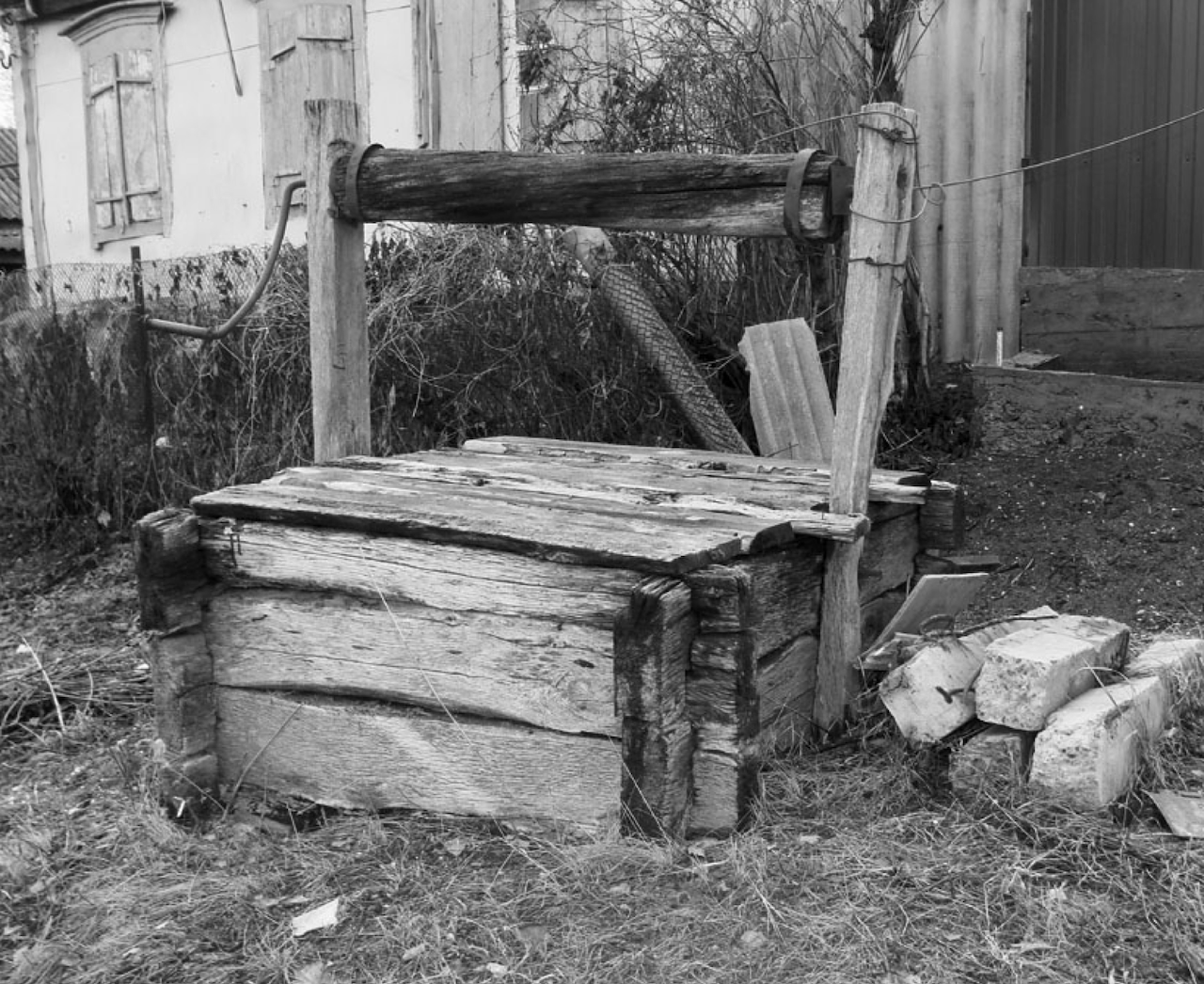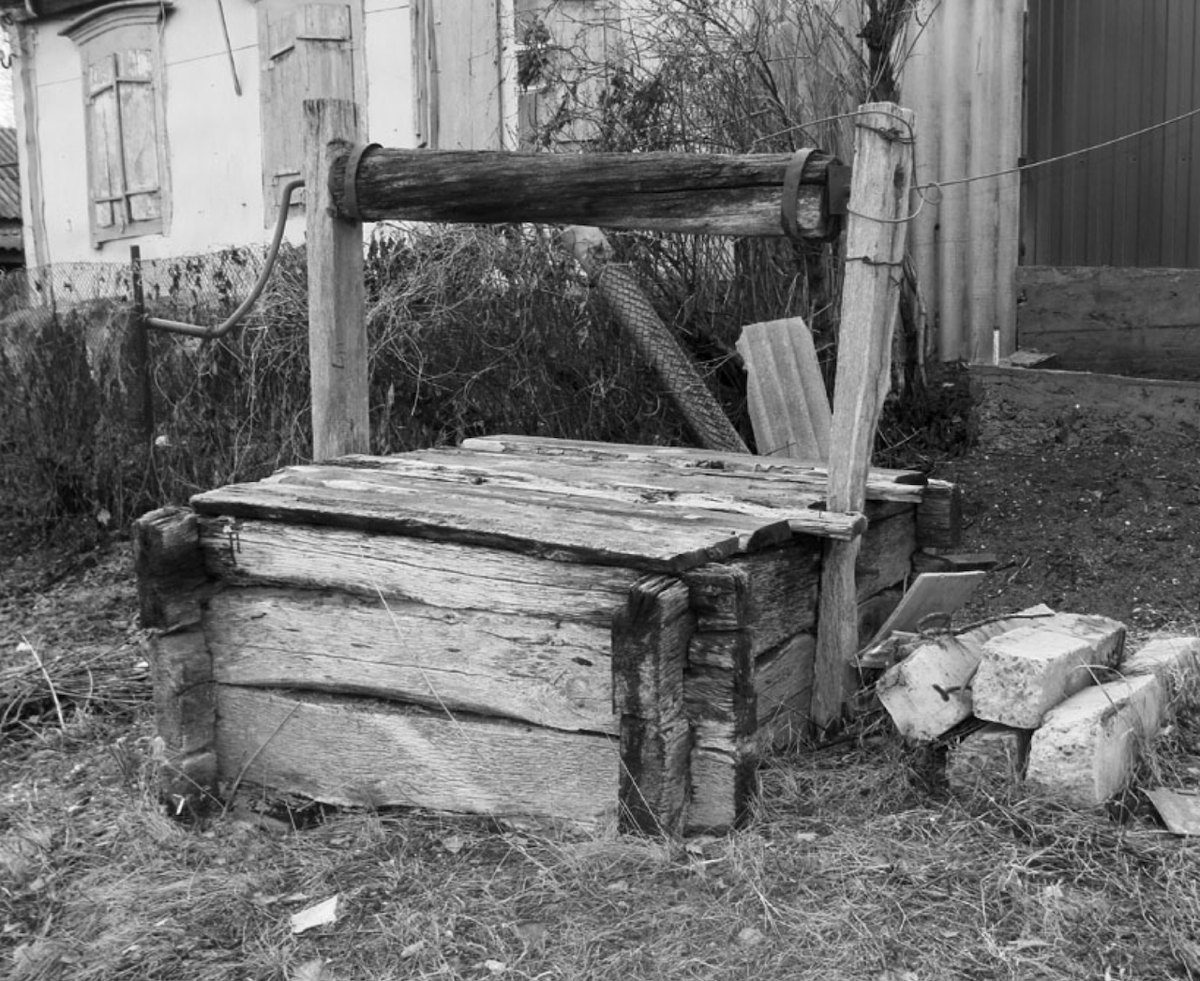

One of the 331 wells dug under Andrei Platonov’s supervision while he worked as a land-reclamation specialist in Russia during the mid-1920s.
An orphan in a dream
Wanders high and low …
Where do orphans come from? They were born on their own. Andrei Platonov’s surrealist novel Chevengur (1927–28) opens with the memorable tale of a fisherman who tries to live in death for a while. He throws himself into a lake to become a fish. Living between life and death, the mute fish “knows everything already.” A few days later, the fisherman is pulled out of the water. He does not return from death. His son, Sasha Dvanov, becomes orphaned. In the feverish years of Revolution and Civil War, Sasha drifts through Russia’s boundless steppe in search of communism.
Chevengur follows Dvanov and his comrade, the peasant-knight Stepan Kopionkin, on a road trip. In a proletarian revamping of Don Quixote, the two horsemen of the Revolution gallop towards socialism. Kopionkin’s horse is called “Strength of the Proletariat,” and his Dulcinea is Rosa Luxemburg, the face of the rolling revolution. On their bewildering odyssey, they meet all sorts of strangers: anarchists, counterrevolutionaries, Cossacks, and a lame man called Fyodor Dostoevsky and his comrade Christopher Columbus.
Written between summer 1927 and May 1929, Chevengur was Platonov’s first and only complete novel. A single copy was printed in 1929 before it was banned until perestroika. Platonov’s unfiltered depictions of Bolshevik terror and repression were risky. Stalin himself penciled “bastard” in the margins of one of Platonov’s stories. Platonov unsuccessfully appealed to Maxim Gorky, who found his novel “extremely interesting but for all its indisputable worth, I do not think that your work will be published.”
Robert and Elizabeth Chandler’s brilliant new translation of Chevengur is based on a version recently reconstructed from Platonov’s manuscripts. With plenty of irony and dark humor, Platonov’s masterpiece captures the delirious time after the October Revolution. Chevengur can be rediscovered today as an ecological parable reflecting on the brutal extractivism of Soviet socialism, and on temporality and nonhuman subjectivities. It is both a picaresque satire and a horrific account of collectivization.
Shortly after the Revolution, the protagonist Dvanov joins the Communist Party and is sent on a mission to build socialism. With the lucidity of a holy fool, Dvanov observes the absurdities of postrevolutionary redistribution: “All very clever,” a peasant remarks. “You give us the land, then confiscate every last grain we grow on it. Well, if that’s the way it is, may you choke on that land.” Narrowly escaping a gang of anarchists, Dvanov is shot in the leg; he keeps limping towards a bright future. Platonov’s proletarian knights, Dvanov and Kopionkin, are orphans of the Revolution; they look for seeds of socialism in the steppe—until they find it in the surreal town of Chevengur.
Like the mythical city of Kitezh, sunk to the bottom of a lake, Chevengur is a fantastic mirage. After communism has been realized, people have nothing left to do. There is no art, no reading, no writing, no postal service, and no wives, only “female comrades-in-arms.” The Chevengurian communists sleep most of the time to rest from centuries of exploitation and oppression. The Cheka (secret police) was abolished after it murdered all kulaks (wealthy peasant farmers), executing not just their bodies but also their souls. Everyone lives like an orphan, sleeping in different beds every night. All doors are always open because every house is empty. Instead of property, the Chevengurians acquire friends. In Platonov’s socialist dream, only the sun works.
Born in 1899 in Voronezh, the oldest of eleven children, Platonov started working at the age of thirteen, first in a factory, then as a train engine driver. On paper, he had the biography of a model proletarian writer. During the Civil War, he was a Red Army journalist. From 1922 to 1926, stationed in Southern Russia to work as an electrical engineer and land-reclamation expert, he oversaw the draining of swamps, the digging of ponds, and the construction of a hydroelectric power plant. Struggling against famines and drought, Platonov witnessed the horrific poverty and starvation following the collectivization of agriculture.
Chevengur was written in the aftermath of Platonov’s work in Russian peasant communities. He saw collective farms where ninety percent of the livestock had died and milkmaids committed suicide. People lived off old cabbage and grass. Platonov’s own brother and sister, aged fourteen and twelve, had died from eating poisonous mushrooms during a devastating famine in 1921. In a letter to his wife, written in January 1927, he reports on the miserable lives he encountered in “such sad places that even the last bit of happiness is shaming.” All his material was out there; the people he met on the road made their way into his notebooks.
One of Platonov’s working titles was Journey with an Empty Heart. The emptiness of Russia’s heartland, the steppe, is a blank canvas to be filled with socialist life. Cycles of life and death arise from the plants and seeds of the steppe; everything grows from its dirty soil. “Orphaned nature” is the raw material for a planetary socialism that transforms the entire earth. Revolution, wrote Platonov, is like the grass that destroys the soil when it grows, or the river that flows through a dry valley. It is a devastating force of nature that rages through the steppe. Like the Bolshevik horsemen, revolution only leaves behind burnt soil and dead trees.
After revolutionary climate change, the ecosystem recovers under communism. Solar comradeship is at the heart of Platonov’s eco-socialist vision. Reporting about the first Soviet solar power station in Tashkent, Platonov stated that socialist production should be based on solar energy. In the past, capitalist exploitation had obstructed the sun. On the first day of Chevengurian communism, the sun greets the proletarian with a comradely smile.
Platonov’s City of the Sun has its own microclimate, where trees grow, grasses flourish, and orchards bear rich fruit. “All nature,” we read, “was fully on the side of Chevengur.” People no longer work but mobilize the sun, which labors on behalf of all proletarians. The sun is a comrade, a “universal proletarian” offering its “wordless friendship.” It even makes things grow from stones; people walk barefoot in its warm rays. Plants too become comrades: “What were the steppe grasslands if not the friendship of living plants?”
One particularly enthusiastic reader of Chevengur was Pier Paolo Pasolini. In 1973, he stated that the first chapter is among “the most beautiful things in Russian literature.” The rest of the novel “has beautiful pages” but is repetitive, structurally weak, and obscure. Pasolini is not entirely wrong. Some chapters seem incomplete and unrelated to the rest of the book. It is not always easy to grasp the plot without clearly defined locations and points of view. The narrative is nonchronological. Read within Platonov’s larger project, however, Chevengur is less an enclosed narrative than a laboratory for his main ideas. For example, the Moscow episode, which stands alone in Chevengur, would be later reworked into Happy Moscow (1933–36).
In the Chandlers’ new translation, Chevengur can be enjoyed in its unity for the first time. The critical apparatus is impressive, with hundreds of endnotes offering intertextual cross-references, historical background, and biographical details. Translating Chevengur is a herculean task. Platonov’s text mixes irony and humor, literary references and folklore with slang and novoyaz, or Soviet newspeak. Platonov even makes up new words by distorting pieces of official propaganda.
Chevengur’s genre and style are chameleonic. Platonov parodies the socialist-realist plot by sending Dvanov on an antiheroic mission to create socialism in the steppe. With great abundance of detail, Chevengur is a multilayered textual montage. The absurd and the factual are interwoven in a way that could be described as socialist surrealism. Under the mask of the farce lies a novel of ideas: “What’s the word for those thoughts that flow first this way, then that way? Dilemmas?” asks Kopionkin modestly. “Dialectics,” Dvanov replies.
Even the best translation is not perfect. One example of a misstep in the new edition is Kopionkin’s quixotic neologism “dubekt,” rendered as “blockhead.” While “blockhead” expresses stupidity, it misses the idea of a dualistic, nonhuman subjectivity. “Dubekt” fuses the split subject with an oak (dub), a solid but unthinking form-of-life. Platonov’s vegetal dubekt is both halved and multiplied. It is the deterritorialized subject of the Revolution—“orphan-like,” uprooted, homeless. Like the orphan, the dubekt has no fixed place; exiled from the earth, it is both itself and outside of itself.
Platonov experienced a similar split himself. In a letter to a friend, he described how suddenly, “just where I usually sit, I saw myself.” For the first time, he saw his living self from above, as if he were someone else. His alter-ego in Chevengur, Dvanov, reflects this dual subjectivity in his name (“dva” meaning two). Platonov theorizes the split subject in a section on the double: “But inside every man there also lives a little onlooker—he takes no part in either his actions or suffering and is always dispassionate and always the same … He lived parallel to Dvanov, but he was not Dvanov.”
Platonov calls this uninvolved witness the “eunuch of the soul.” Valery Podoroga wrote that Platonov’s “art of seeing” employs a depersonalized gaze; the world is seen through the transindividual eye of humanity. Similarly, the Chevengurians, called only “others,” are emptied of their individual identity. They all wear the same face: poor, wretched, exhausted; “all the traits of [their] personality had been erased by the Revolution.” The new Soviet soul is a collective and impersonal body. Animals, plants, and machines are part of this laboring body. Chevengur beautifully captures this corporeality of early communist life-building.
Platonov’s people sink back into nature; their life is like “the life of the grasses in the bottom of a hollow.” Nourished by the sun, both plants and proletarians endure the heat of life: “Everyone now knew that it is difficult to grow grain, that the life of plants is as complex and tender as the life of human beings, and the sun’s rays make the earth sweat from exhausting labor.” Platonov’s depersonalized subjects “live naked.” Misfortune passes through those poor people like rain pours down on the steppe.
This bare life is an expression of what Pasolini called, with admiration, Platonov’s exquisite “poverty of spirit.” Chevengur can be read as a phenomenology of poor spirit, traversing the endless steppe. Different temporal modes clash: vegetal, cyclical time is contrasted with revolutionary progress. The duality of time also marks life in Chevengur; communist time moves like in a dream: “a moment—yet it flowed.”
Chevengur is Platonov’s vision of a postrevolutionary End of History: “History has ended—and you haven’t even noticed.” At a party assembly, Dvanov draws up a symbol for a monument for the Revolution. He explains that the “figure eight denotes the eternity of time, while the upright double-ended arrow denotes the infinity of space.” Dvanov’s drawing captures the nature of revolutionary time, both rupture and cyclical return. “History is sad, because history is time and it knows that it will be forgotten,” explains Sasha to Comrade Chepurny, a party bureaucrat. Revolution marks a linear irreversibility of time, while communism is depicted as a return to the cyclical rhythms of nature.
Chevengurian communism is precarious. It appears eternal but can end at any time. Eventually, our revolutionary knights return to their horses and roam the steppe again. Unable to publish Chevengur, Platonov was spared during the Stalinist purges while his son was sent to the gulag on charges of terrorism. Platonov was infected with tuberculosis when nursing his son after his return; he died in 1951. The end, we read in Chevengur, is not in literature, but in life: “Communism’s no joke—it’s the end of the world!”
